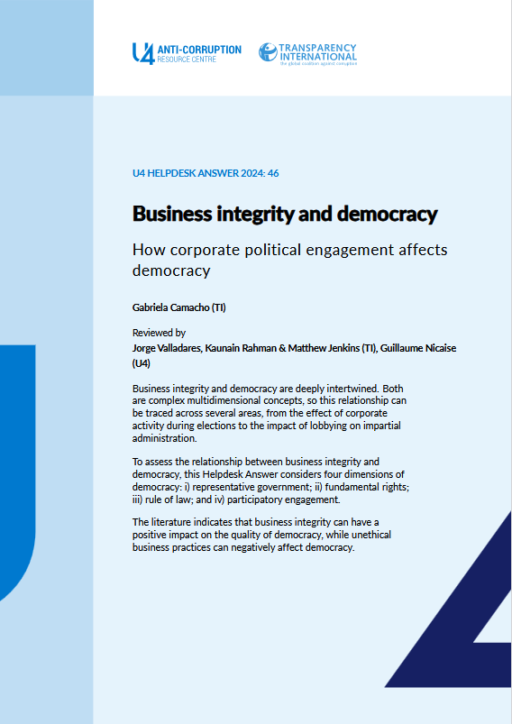
This Anti-Corruption Helpdesk brief was produced in response to a query from a U4 Partner Agency. The U4 Helpdesk is operated by Transparency International in collaboration with the U4 Anti-Corruption Resource Centre based at the Chr. Michelsen Institute.
Query
How does business integrity relate to the quality of democracy?
Summary
Business integrity and democracy are deeply intertwined. Both are complex multidimensional concepts, so this relationship can be traced across several areas, from the effect of corporate activity during elections to the impact of lobbying on impartial administration.
To assess the relationship between business integrity and democracy, this Helpdesk Answer considers four dimensions of democracy: i) representative government; ii) fundamental rights; iii) rule of law; and iv) participatory engagement.
The literature indicates that business integrity can have a positive impact on the quality of democracy, while unethical business practices can negatively affect democracy.
Main points
- Business integrity and democracy can be mutually reinforcing. Ethical business activity and political engagement can have a positive impact on the quality of democracy (virtuous cycle), while unethical business practices and behaviours can have a negative impact on democracy (vicious cycle).
- Businesses can provide expertise to the policy process and ensure that legitimate points of view are being heard. By fostering informed policymaking, they can contribute to the quality of democracy.
- Ethical business practices can buttress the rule of law, a fundamental component of democracy, both by setting positive examples and by reducing the impact that supply-side corruption has in eroding impartial administration. As rule of law improves, democratic accountability may increase, meaning that businesses have fewer opportunities for unethical behaviour, further reinforcing democratic institutions.
- Unethical practices can entail liability and reputational risks for companies, particularly where the public grows aware of corporations’ behaviour.
- Forms of corporate political engagement that result in policy capture can lead to the (justifiable) perception that narrow interest groups control economic opportunities and that public institutions do not protect the public interest, undermining trust in democracy.
Contents
- Introduction
- Business integrity and the quality of democracy
- Business integrity across different dimensions of democracy
- Representative government
- Fundamental rights
- Rule of law
- Participatory environment
- Corproate transparency and integrity
- References
Authors
Gabriela Camacho (TI)
Reviewers
Jorge Valladares, Kaunain Rahman & Matthew Jenkins (TI), Guillaume Nicaise (U4)
Date
02/12/2024
Tags
 Download PDF
Download PDF
